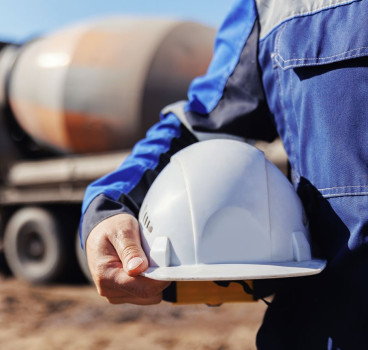A call for climate resilience in the construction industry
The Canadian Construction Association (CCA) has recently released a critical report highlighting the urgent need for increased investment and stronger policies to protect its people and their critical infrastructure from the increasing threats of climate change. It’s a report which could be applied to almost any country in the world and is yet another wake up call for all of us in the building business, writes John Ridgeway.
The Canadian report, entitled "Climate resilience in construction - Building for a sustainable future," emphasises the importance of building resilient infrastructure that can withstand extreme weather events, protect lives and support community well-being.
The construction industry plays a vital role in shaping our built environment by ensuring the resilience of our communities, however, the increasing frequency and intensity of climate-related disasters, such as flooding, wildfires and extreme heat, are posing significant challenges to infrastructure and safety.
According to the report, there is now a need for urgent action to address these challenges. Investment in resilient infrastructure is crucial to protect our communities and ensure the long-term sustainability of our built environment. Additionally, stronger policies are needed to support the construction industry in its efforts to reduce its environmental impact and build more resilient infrastructure.
The growing threat of climate change
Recent events in Canada, such as the flooding in Toronto and wildfires in Jasper, have demonstrated the devastating impacts of climate change on communities. These events disrupt everyday life, cause property damage and pose serious risks to public safety.
Furthermore, the aging infrastructure in many Canadian cities and towns – a situation which is similar across the world - makes it particularly vulnerable to the effects of climate change. Deteriorating roads, bridges and water systems can fail under the strain of extreme weather events, leading to disruptions and costly repairs.
We are already aware that the construction industry is taking steps to build more sustainably, but significant progress is needed to address the challenges posed by climate change. The report calls for increased investment, strategic planning and collaboration to ensure that our infrastructure is both resilient and sustainable.
It also highlights the need for incentives to pilot new processes and technologies. By investing in research and development, the report claims, the construction industry can develop innovative solutions to address the challenges of climate change.
The CCA's report is a clear call to action for both the construction industry and policymakers. To protect our communities and infrastructure, we must invest in resilience and take proactive steps to address the challenges of climate change.
Similar challenges and initiatives globally
The challenges posed by climate change are not just confined to Canada. Countries around the world are facing similar threats and the construction industry is playing a crucial role in addressing these challenges.
In the United States, the construction industry has been at the forefront of efforts to build more resilient infrastructure. Building codes have been updated to include requirements for resilience to extreme weather events, such as hurricanes, earthquakes and floods. These codes mandate the use of stronger materials, improved construction techniques and the incorporation of disaster-resistant features.
In Europe, a significant focus has been on retrofitting existing buildings to make them more energy-efficient and climate-resistant. This involves upgrading insulation, installing renewable energy systems and improving energy efficiency measures. By retrofitting existing buildings, Europe is working to reduce its carbon footprint and improve the resilience of its built environment.
The challenges of climate change are global in nature, and addressing them requires international cooperation. By sharing knowledge, best practices, and resources, countries can learn from each other and develop more effective solutions.
International organisations and forums are playing a crucial role in facilitating collaboration and promoting climate resilience in the construction industry. By working together, countries can accelerate progress and build a more sustainable future for all.
That said, the challenges posed by climate change are not just confined to Canada or the United States. Countries around the world, including those in Asia, are grappling with the increasing threats of extreme weather events and the need for more resilient infrastructure.
Australia - a focus on climate resilience
Australia has experienced a number of devastating natural disasters in recent years, including extreme heat, bushfires and flooding. These events have highlighted the urgent need for the construction industry to adopt more resilient building practices.
The Australian government has implemented various policies and incentives to promote sustainable building practices and reduce the impact of climate change. These initiatives have included provisions for climate resilience, requiring buildings to be designed and constructed to withstand extreme weather events.
The government offers grants and incentives to encourage the adoption of sustainable building practices, such as energy-efficient design and the use of renewable energy. They also support research and development projects aimed at developing innovative solutions for climate-resilient construction.
In Japan, there is a strong focus on earthquake-resistant construction practices. In China, the government has implemented policies to promote green building and energy efficiency.
All this adds up for yet another reminder that the construction industry plays a crucial role in building resilient communities to protect us from the impacts of climate change. We must continue to invest in sustainable infrastructure and adopt innovative solutions, to create a more resilient and sustainable future for generations to come. The only question is – how long do we have to keep talking about it?
Additional Blogs

4 Must-Follow Health and Safety Habits for the Modern Jobsite
The risks in modern jobsites are constant. Falls, chemical exposure and heat illnesses continue to injure workers across construction and related industries each year. The best way to reduce those...
Read moreDesigning multi-functional outdoor spaces through the power of Play Trees
Outdoor spaces are increasingly expected to do more than simply look good. They must invite interaction, support wellbeing, encourage movement and foster connection across generations. In schools,...
Read more

4 Ways Resilient Construction Gets it Right and 4 Ways It’s Still Falling Short
Climate change is becoming increasingly disruptive as the weather becomes stronger and more unpredictable. These circumstances are constantly pressuring the construction industry, which has had to...
Read more